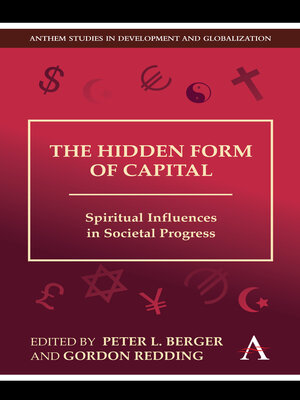
Sign up to save your library
With an OverDrive account, you can save your favorite libraries for at-a-glance information about availability. Find out more about OverDrive accounts.
Find this title in Libby, the library reading app by OverDrive.



Search for a digital library with this title
Title found at these libraries:
| Library Name | Distance |
|---|---|
| Loading... |
'The Hidden Form of Capital' presents evidence from several parts of the changing world about how the realm of the spirit affects the economy. Instead of adding to the theoretical speculation on the role of culture in economic progress, this book provides evidence from recent analytical studies in Europe, Asai, Africa, Russia, and the United States.
|'The Hidden Form of Capital' presents evidence from several parts of the changing world about how the realm of the spirit affects the economy. The idea that societies have economic cultures as well as aesthetic, literary, and artistic cultures is well-embedded in a number of major studies attempting to identify the origins of national wealth and progress. This book provides an original contribution to the debate, by discussing the relationship between religion and the economy not via further theoretical speculation, but through the presentation of analytical evidence from real-life case studies in Europe, Asia, Africa, Russia, and the United States.
There is currently a major re-assessment of assumptions about the foundations of societal progress, as the market rationality model is exposed for its moral weaknesses. The emergence of socio-economics as a scholarly field, as well as the embracing of complexity theory and the societal effect in economic analysis, brings the question of cultural effects to the forefront. This collection of studies offers more practical and tangible evidence, especially unique and useful for its comparative aspect. The book skilfully combines this comparative and descriptive character with an accessible writing style intended for a wide audience.







